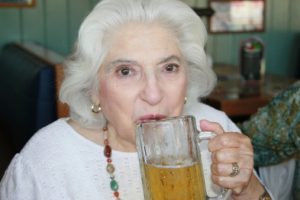
Binge drinking is a term used when an individual consumes excessive amounts of alcohol in a short amount of time, and new findings are reporting that the prevalence of binge drinking is increasing dramatically in older women. This data shows that this rate is climbing much faster than that of male binge drinkers.
Researchers are surprised at this outcome, as the average prevalence of binge drinking in males had, for the most part, remained stable from 1997 to 2014, while the prevalence of female binge drinkers increased an average of four percent over the same time.
“Increased drinking and binge drinking can be a serious health problem for women,” said study author Rosalind Breslow, an epidemiologist at the U.S. National Institute on Alcohol Abuse and Alcoholism.
Breslow goes on to explain that women don’t tolerate alcohol the same way men do. Women tend to be more susceptible to the long-term negative side effects of alcohol at lower consumption levels than men. One of the reasons for this discrepancy is simply the differences in water compositions in men and women. Men tend to be larger and weigh more, therefore, the water composition of their bodies is much more than the average women. Alcohol dissolves in water, leading women to be inherently less tolerant to the effects of alcohol than men.
“So, after a man and woman of the same weight drink the same amount of alcohol, the woman’s blood alcohol concentration will tend to be higher, putting her at greater risk for harm,” Breslow said.
For this particular study, researchers collected data on more than 65,000 men and women aged 60 and older who were current drinkers. In this group, 6,500 men and 1,700 women were binge drinkers.
Women have a lower tolerance, and being older further increases their risk of effects from alcohol when compared to younger adults. The elderly population is simply more sensitive to alcohol, as their potential for experiencing falls and injuries increases dramatically when intoxicated.
Understanding why this trend of older women drinkers is increasing is a difficult one. Some of the researchers speculate that younger baby boomers—in their early 60s—simply drink more than generations past, or that it is more culturally acceptable for women to drink in general. Regardless of the reasons why, excessive drinking is just too dangerous, increasing the chance of being injured or even killed. Sixty percent of fatal burn injuries, drowning, and homicides, 50 percent of severe trauma injuries and sexual assaults, and 40 percent of fatal motor vehicle crashes, suicides, and fatal falls have in some way or another involved alcohol.
This is not to mention all the chronic effects that long term binge drinkers face. Liver disease, heart disease, and even depression—just to name a few—are problems brought on by excessive drinking. Alcohol can also make managing various diseases such as diabetes and high blood pressure very difficult.
Breslow recommends more awareness regarding just how much alcohol you consume. She also says that adults over the age 65 who are healthy and not on any medications should have no more than three drinks a day or seven drinks in a week. She goes on to say that alcohol consumption in the elderly should be based on their health and how it affects them, with emphasis on reducing the amount of drinking or not drinking at all.
Related: Cirrhosis risk increases with daily alcohol drinking: Study